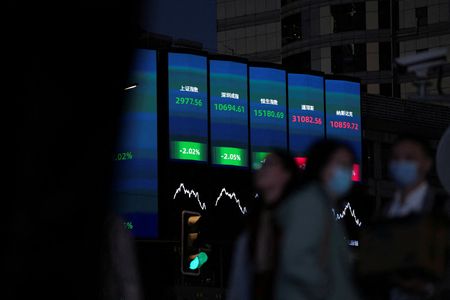 1
1 1
1

By Sinéad Carew and Lawrence White
NEW YORK/LONDON (Reuters) – Wall Street equities deepened losses on Monday while U.S. oil futures reversed course to settle higher on production rumors after starting the day mired in worries that China’s strict COVID-19 restrictions would stunt global economic growth.
While a surge in COVID cases and clashes between police and protesters across several major Chinese cities over the weekend helped push U.S. Treasury yields lower, that move had also reversed course in afternoon trading.
“The China protest news was the source of market sentiment souring this morning but we’re also coming off a strong few weeks,” said Mona Mahajan, senior investment strategist at Edward Jones, referring to stock trading. The Dow Jones industrial average for example had risen more than 10% in the last month and almost 20% since September.
“Some of this is just a bit of consolidation from the last few weeks,” she said, noting that stocks had taken a leg lower when Treasury yields gained and oil prices switched from red to green on Monday as the prospect of higher oil prices brought inflation concerns back to the forefront.
Along with inflation trends, investors are also monitoring Federal Reserve commentary for any clues on its future rate hiking path. While New York Federal Reserve President John Williams declined to say how far and fast he believes the central bank will need to hike rates in coming months he said that it could be 2024 before rates are cut.
The Dow Jones Industrial Average fell 497.57 points, or 1.45%, to 33,849.46, the S&P 500 lost 62.17 points, or 1.54%, to 3,963.95 and the Nasdaq Composite dropped 176.86 points, or 1.58%, to 11,049.50.
MSCI’s gauge of stocks across the globe shed 1.42%. Emerging market stocks lost 1.13%.
Earlier, U.S. crude oil futures had fallen to December 2021 levels on concerns about demand in China – the world’s biggest crude importer.
But the commodity since regained lost ground on speculation ahead of the Dec. 4 meeting of the Organization of the Petroleum Exporting Countries and allies including Russia, a group known as OPEC+. In October, OPEC+ agreed to reduce its output target by 2 million barrels per day through 2023.
U.S. crude settled up 1.26% at $77.24 per barrel and Brent settled at $83.19 a barrel, down 0.5% on the day but still well below its trough of the day.
In currencies, the dollar rose against the euro after earlier falling as both U.S. and European policy makers sounded hawkish tones.
European Central Bank President Christine Lagarde on Monday hinted at a series of interest rate hikes ahead, saying euro zone inflation has not yet peaked and risks turning out even higher than current expectations.
The dollar index rose 0.339%, with the euro down 0.59% at $1.0334.
The Japanese yen strengthened 0.14% versus the greenback at 138.90 per dollar, while Sterling was last trading at $1.1951, down 1.17% on the day.
Treasury prices swung around during the session with Fed speakers pushing back on the notion that the U.S. central bank could soon cut interest rates to revive the economy.
Benchmark 10-year notes were down 1.3 basis points at 3.689%, from 3.702% late on Friday.
Earlier, China announced a fifth consecutive day of record new local COVID-19 cases with 40,052 infections on Monday, while in Shanghai demonstrators and police clashed on Sunday night.
Gold prices gave up gains after touching a one-week high of $1,763.70 per ounce. Spot gold dropped 0.9% to $1,740.72 an ounce. [GOL/]
(Reporting Sinéad Carew and Karen Brettell in New York, Lawrence White in London, Scott Murdoch in Sydney; Editing by Susan Fenton and Matthew Lewis)